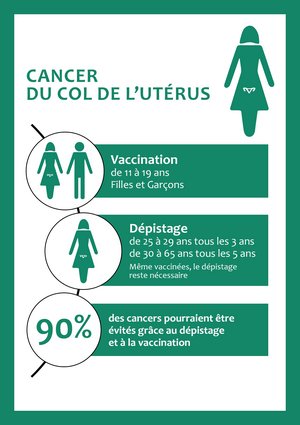June Green 2023: Let's all take action against cervical cancer!
in Communication
Posted on 06/05/2023

Every year in France, cervical cancer affects almost 3,000 women and causes around 1,100 deaths.
Cervical cancer is caused by a virus called human papillomavirus (HPV). This virus, which is present in tissues and mucous membranes, is most often transmitted during sexual intercourse. Most men and women will be infected by this virus during their lifetime. In some cases, this infection persists and can cause lesions which, if left untreated, can develop into cancer 10 to 20 years after infection.
To prevent persistent HPV infection, the health authorities recommend that girls and boys aged 11 to 14 should be vaccinated (with catch-up vaccination up to and including age 19). The HPV vaccine is available to everyone and is covered by social security.
Screening for cervical cancer is carried out using a cervico-uterine test, more commonly known as a smear test. This enables precancerous or cancerous lesions to be detected before they develop into cancer. All women aged between 25 and 65, including post-menopausal women who have not had sexual intercourse or who have been vaccinated against the human papillomavirus, are eligible for screening. Before the age of 30, two screening tests should be carried out at one-year intervals, followed by a test every three years if the results are normal. Between the ages of 30 and 65, a screening test every five years is recommended, starting three years after the last normal screening test.
The CRRO treats patients with cervical cancer as part of their radiotherapy: as a reference treatment for tumours larger than 4 centimetres or tumours that have spread beyond the uterus into the pelvic cavity; or after surgery for tumours limited to the cervix and smaller than 4 centimetres, if examination of the surgical specimen shows that the lymph nodes have been invaded by cancer cells.







